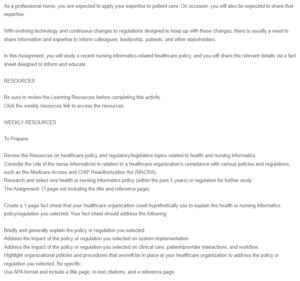The 21st Century Cures Act
The 21st Century Cures Act was enacted in 2016 with the aim of accelerating innovation in medical product development and treatments (HealthIT.gov, n.d.). The 21st Century Cures Act aims to improve the efficiency of healthcare systems in the delivery of care by promoting the interoperability of electronic health records (EHRs), promoting the use of actual patient data to support care and policy decisions as well as sharing of data to improve innovation (Klonoff, 2019). The ACT also supports patient access to their health data.
Impact of the 21st Century Cures Act on System Implementation
The 21st Century Cures Act significantly impacts systems implementation as it requires all healthcare organizations to implement interoperable EHR systems. It requires that these health information systems be implemented in a manner that enables secure and accurate data sharing across the systems to support research and innovation. The Act has also changed system implementation by focusing on patient data safety and requiring the system be configured during the implementation phase in a way that allows patients to access and have control over their health information.
Impact of the 21st Century Cures Act on Clinical Care, Patient/Provider Interactions, and Workflow
The 21st Century Cures Act has changed how patient data is accessed and shared. This has significantly improved care decisions and the quality of clinical care. The requirement for all systems to have patient access to health information has improved digital health equity (Rodriguez et al., 2020). Having patient access their health data through systems such as patient portals has improved the efficiency of how patients and healthcare providers communicate, interact, and relate. Patients are becoming more involved in making their health decisions, making care and development of evidence more inclusive (Khozin & Coravos, 2019). The sharing of data requirements makes it easier for healthcare professionals and facilities to share and access patient data across departments and facilities.
Organizational Policies and Procedures to Address The 21st Century Cures Act
Specific policies and procedures in my organization to address the 21st Century Cures Act are interoperability standards to help adhere to data sharing requirements, patient portals to facilitate patient access to health information, patient and staff training on the use of new systems, and user training on data and systems security.
References
HealthIT.gov. (n.d.). Health IT Legislation. Retrieved November 7, 2023, from https://www.healthit.gov/topic/laws-regulation-and-policy/health-it-legislation
Khozin, S., & Coravos, A. (2019). Decentralized Trials in the Age of Real-World Evidence and Inclusivity in Clinical Investigations OPINION Decentralized Trials in the Age of Real-World Evidence and Inclusivity in Clinical Investigations. CLINICAL PHARMACOLOGY & THERAPEUTICS |. https://doi.org/10.1002/cpt.1441
Klonoff, D. C. (2019). The New FDA Real-World Evidence Program to Support Development of Drugs and Biologics. Journal of Diabetes Science and Technology, 14(2), 345–349. https://doi.org/10.1177/1932296819832661
Rodriguez, J. A., Clark, C. R., & Bates, D. W. (2020). Digital Health Equity as a Necessity in the 21st Century Cures Act Era. JAMA, 323(23), 2381–2382. https://doi.org/10.1001/JAMA.2020.7858
ORDER A PLAGIARISM-FREE PAPER HERE
We’ll write everything from scratch
Question

The 21st Century Cures Act
As a professional nurse, you are expected to apply your expertise to patient care. On occasion, you will also be expected to share that expertise.
With evolving technology and continuous changes to regulations designed to keep up with these changes, there is usually a need to share information and expertise to inform colleagues, leadership, patients, and other stakeholders.
In this Assignment, you will study a recent nursing informatics-related healthcare policy, and you will share the relevant details via a fact sheet designed to inform and educate.
RESOURCES
Be sure to review the Learning Resources before completing this activity.
Click the weekly resources link to access the resources.
WEEKLY RESOURCES
To Prepare:
Review the Resources on healthcare policy and regulatory/legislative topics related to health and nursing informatics.
Consider the role of the nurse informaticist in relation to a healthcare organization’s compliance with various policies and regulations, such as the Medicare Access and CHIP Reauthorization Act (MACRA).
Research and select one health or nursing informatics policy (within the past 5 years) or regulation for further study.
The Assignment: (1 page not including the title and reference page)
Create a 1-page fact sheet that your healthcare organization could hypothetically use to explain the health or nursing informatics policy/regulation you selected. Your fact sheet should address the following:
Briefly and generally explain the policy or regulation you selected.
Address the impact of the policy or regulation you selected on system implementation.
Address the impact of the policy or regulation you selected on clinical care, patient/provider interactions, and workflow.
Highlight organizational policies and procedures that are/will be in place at your healthcare organization to address the policy or regulation you selected. Be specific.
Use APA format and include a title page, in-text citations, and a reference page.


